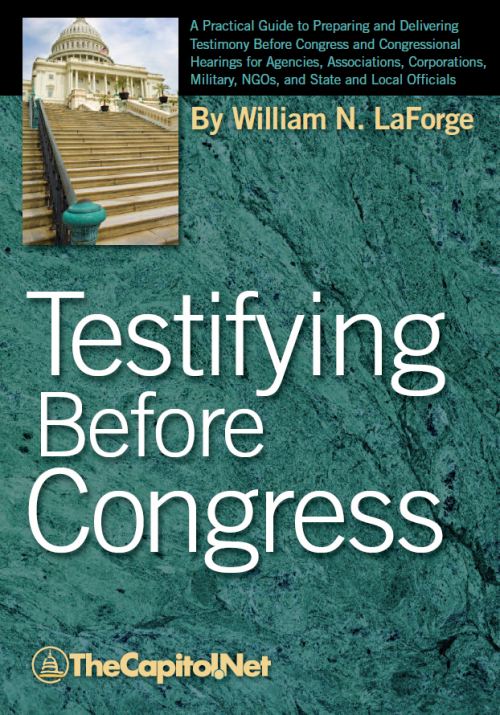If you have been called to testify before a Congressional hearing or think that you might be called to do so in the future, it can be helpful to have a basic understanding of the various types of Congressional hearings and their purposes.

The main purpose of any Congressional hearing is to obtain information from witnesses that will be beneficial to the committee regarding its work on legislation or other matters. There are actually many different types of Congressional hearings. The seven main types of Congressional hearings include:
- Legislative Hearings
- Budget and Appropriations Hearings
- Oversight and Investigative Hearings
- Senate Advice and Consent Hearings-Nominations, Confirmations and Treaties
- Field Hearings
- Showcasing, Publicity, Celebrity and Grandstanding Hearings
- Public or Open Hearings and Closed or Classified Hearings
Generally, Congressional hearings will be conducted inside the U.S. Capitol complex, which includes the Capitol building as well as the Senate and House office buildings adjacent to the Capitol building. Each year hundreds of hearings are held by each chamber of Congress. The purpose and the number of hearings are at the prerogative of each individual committee.
Legislative hearings are intended to help committees review legislative proposals or to sometimes add new law to or modify the United States Code.
Budget and appropriations hearings are conducted for the purpose of reviewing the president’s budget requests. They are conducted by the House and the Senate Budget Committees.
Oversight and investigative hearings may be conducted anytime there is a public policy question or a question regarding government action or accountability.
Senate advice and consent hearings are held for the purpose of considering and passing judgment regarding presidential nominations for U.S. diplomatic posts, cabinet positions, federal judges and treaties with foreign countries.
Field hearings are those hearings that are conducted outside of Washington. These hearings may focus on a particular regional issue. They are usually utilized for responding to some type of crisis or emergency.
Showcasing, publicity, celebrity and grandstanding hearings typically involve some type of unique or controversial issue. They are commonly utilized for drawing attention to a particular issue. A celebrity hearing will often involve the testimony of a celebrity witness.
Public or open hearings are open for the public to attend. Most Congressional hearings are open. Hearings that are typically closed to the public include those that may involve matters of national security, certain foreign policy issues or matters involving rules of the Senate or House that  may have been violated.
may have been violated.
To learn more about Congressional hearings, consider our 1-day course in Washington, DC: Congressional Dynamics and the Legislative Process; or our 3-day Capitol Hill Workshop.
Reference: Section 1.50-the Purposes and Types of Congressional Hearings, in Testifying Before Congress, by William LaForge
For more than 40 years, TheCapitol.Net and its predecessor, Congressional Quarterly Executive Conferences, have been teaching professionals from government, military, business, and NGOs about the dynamics and operations of the legislative and executive branches and how to work with them.
Our custom on-site and online training, publications, and audio courses include congressional operations, legislative and budget process, communication and advocacy, media and public relations, testifying before Congress, research skills, legislative drafting, critical thinking and writing, and more.
TheCapitol.Net is on the GSA Schedule, MAS, for custom on-site and online training. GSA Contract GS02F0192X
TheCapitol.Net is now owned by the Sunwater Institute.
Teaching how Washington and Congress work ™

